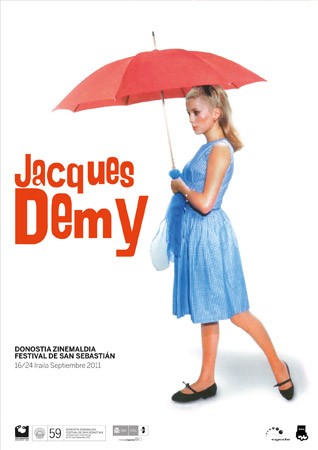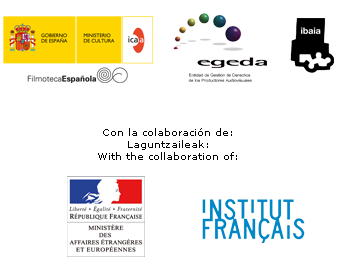In its 59th edition, San Sebastian Festival will dedicate a complete retrospective to the work of French filmmaker Jacques Demy (Pontchâteau, 1931-Paris 1990), a figure key to French cinema who pumped surprising new breath into the musical genre. Although initially grouped with other young directors belonging to the nouvelle vague movement,Demy’s work eventually became so unique and difficult to classify that he set off along his own, absolutely personal path. His original approach to “singing cinema” and his exquisite sense of artistic direction always shunned the movie fashions or trends of the moment.
Demy studied Fine Arts, starting in animation cinema as an assistant to Paul Grimault. He later worked as an assistant director to the documentary-maker, Georges Rouqier, who produced his first short, Le Sabotier du Val de Loire (1955). Having directed several short films, Demy made his debut in features with the first of his great films, Lola (1960), an emblematic title among French new wave movies. He reconfirmed his talent in a melodrama set in the gambling world, La baie des anges (Bay of Angels, 1963), starring Jeanne Moreau.
However, it was his third film that send ripples through the celluloid world and overwhelmingly established his peculiar vision of film: Les parapluies de Cherbourg (The Umbrellas of Cherbourg, 1964), winner of a Palme d’Or at Cannes Festival and nominated for the Academy Award for Best Foreign Language Film. Starring Catherine Deneuve, this brilliant new take on the musical where dialogue is replaced by song, was to find a continuation in his delicious homage to Hollywood movies, Les demoiselles de Rochefort(The Young Girls of Rochefort, 1967), in which Deneuve and François Dorleac rub shoulders on the cast with a myth of musical films, Gene Kelly.
In his next works, Demy continued exploring his extravagant aesthetics and cinematic narrative bringing us, among others, the remarkable Model Shop (1969), reflecting his view of American society at that time; Peau d’âne (Donkey Skin, 1970), a fascinating look at the world of children’s stories once again starring Catherine Deneuve; Lady Oscar (1979), adaptation of the Japanese manga “The Rose of Versailles;” Une chambre en ville (1982), yet another musical about a tragic love story set against a political backdrop; and Trois places pour le 26 (Three Places for the 26th, 1988), a last work in which fiction and reality merge to portray the life and career of actor Yves Montand.
A book on the filmmaker's work coordinated by Quim Casas and Ana Cristina Iriarte will be edited.
This cycle is co-organised with the Filmoteca Española and sponsored by EGEDA and IBAIA.
JACQUES DEMY
Shorts:
- Le sabotier du Val de Loire (France, 1956)
- Le bel indifférent (France, 1957)
- Ars (France, 1959)
- Les sept péchés capitaux: segmento La luxure (The Seven Deadly Sins: La Luxure segment),
(France-Italy, 1962)
Feature films:
- Lola (France-Italy, 1961)
- La baie des anges (Bay of Angels), (France, 1963)
- Les parapluies de Cherbourg (The Umbrellas of Cherbourg), (France-West Germany, 1964)
- Les demoiselles de Rochefort (The Young Girls of Rochefort), (France, 1967)
- Model Shop (France-USA, 1969)
- Peau d’âne (Donkey Skin), (France, 1970)
- The Pied Piper (UK-USA, 1972)
- L’ événement le plus important depuis que l’ homme a marché sur la lune (A Slightly Pregnant Man), (France-Italy, 1973)
- Lady Oscar (Japan, 1979)
- La naissance du jour (TV MOVIE) (France, 1980)
- Une chambre en ville (France-Italy, 1982)
- Parking (France, 1985)
- Trois places pour le 26 (Three Places for the 26th), (France, 1988)
- La table tournante (France, 1988)
Classic retrospective
A regular chapter in the Festival retrospective section has been a cycle dedicated to a classic director, enabling us to appreciate the little or virtually unknown work of such filmmakers as Robert Siodmak, James Whale, William Dieterle, William A. Wellman, Gregory La Cava, Tod Browning, Mitchell Leisen, Mikio Naruse, John M. Stahl, Carol Reed, Frank Borzage, Michael Powell, Preston Sturges, Anthony Mann, Robert Wise, Ernst Lubitsch, Henry King, Mario Monicelli, Richard Brooks and Don Siegel.






